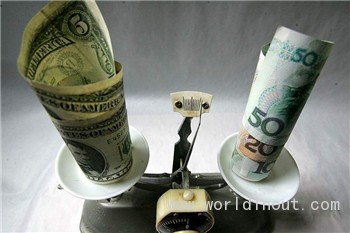
The renminbi closed at its softest level in more than four years against the dollar on Tuesday as investors continued to fret about the capital outflows evident from currency reserve data published earlier in the week.
Weakness was even more marked in the more volatile offshore market, where the spread between onshore and offshore rates reached its highest in more than three months, implying investors expect China’s currency to continue weakening.
Tuesday’s onshore daily “fix” by the People’s Bank of China set the renminbi at Rmb6.4078 to the dollar, 0.15 per cent weaker than Monday, and the pair later closed at Rmb6.4179. The offshore rate — not restricted like its onshore counterpart to a 2 per cent band either side of the fix rate — fell by 0.3 per cent twice and closed at Rmb6.4919 — just shy of its Rmb6.5112 peak late in August.
The renminbi’s weakness was considered a sign that investors were testing just how far and how fast China was prepared to let its currency decline as it manages a slowing economy. Forecasts for a softer renminbi have grown bolder since the currency was givenreserve status by the International Monetary Fund late last month.
“It appears that China’s central bank intends to engineer a managed depreciation in the renminbi as the economy slows, which makes sense from both policy and economic perspectives,” said Commerzbank strategist Zhou Hao, who said further weakness was “inevitable”.
He also highlighted investor fears that the recent rise in volatility would spike further — another factor likely to weigh on the currency.
“Of course, there is little doubt that PBoC will intervene intensively when they deem that market volatility is too high,” he added.
The onshore renminbi has fallen about 3 per cent against the dollar so far this year, leaving China’s exporters at a competitive disadvantage compared with many Asian rivals whose currencies have fallen further — and also against those of the eurozone, whose currency has weakened more than 10 per cent.
HSBC strategists on Tuesday said they had lowered their 2016 year-end forecast for the renminbi to Rmb6.7 from Rmb6.6 previously.
Goldman Sachs has a target of Rmb6.6 by the end of next year.







